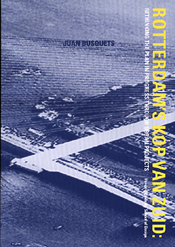Rotterdam's Kop Van Zuid: Rethinking the Plan in Progress through Urban Projects
 During the later part of the twentieth century, at the same time that we are experiencing increasing levels of globalization and the diminution of spatial distinctions between one place and another, we are also becoming increasingly aware of the specific cultural production of urban space. Even among closely aligned societies within the Western world, the differences in this production can be quite profound and long lasting. Simply put, subtle and unobtrusive though often they may be, such distinctions make the difference between the urban design and development practices appropriate in one urban area versus another. Thus, while perhaps acquiring similar infrastructure, service industries and the other accoutrements of aspiring international societies, cities like, say, Barcelona and Milan remain just that: Barcelona and Milan!
During the later part of the twentieth century, at the same time that we are experiencing increasing levels of globalization and the diminution of spatial distinctions between one place and another, we are also becoming increasingly aware of the specific cultural production of urban space. Even among closely aligned societies within the Western world, the differences in this production can be quite profound and long lasting. Simply put, subtle and unobtrusive though often they may be, such distinctions make the difference between the urban design and development practices appropriate in one urban area versus another. Thus, while perhaps acquiring similar infrastructure, service industries and the other accoutrements of aspiring international societies, cities like, say, Barcelona and Milan remain just that: Barcelona and Milan!
In order to gain a practical as well as theoretical appreciation of these phenomena, and to develop a greater awareness of the various classes of urban design problems confronting societies in various parts of the world, the Graduate School of Design at Harvard has created a studio program with a deliberate outward orientation and involvement in real-world issues.
This is particularly apparent in urban design, perhaps where such an orientation matters most, providing both faculty and students with opportunities to gain a firsthand understanding of foreign design contexts, as well as different ways of conceptualizaing and making urban environments. For the host community involved, these design studio experiences often provide those concerned with fresh and unorthodox views of old and existing problems, as well as a venue for reflecting on proposals outside of the usual controversy of local debates.
The studio, conducted in the Rotterdam port area of the Netherlands by Professor Busquets during the fall semester of 1997, is an excellent example of this two-fold experience. As the following pages document, proposals were prepared by students which provided those participating from Rotterdam with points of comparison and potential insights for their own deliberations. From their perspective, the students profited enormously from firsthand acquaintance with the City of Rotterdam adding appreciably, in turn, to both the breadth and depth of discussion on urban issues within the School. Consequently, for at least these reasons, we are all grateful to the City of Rotterdam for its support and continuing interest in our collective efforts.
— Peter G. Rowe
Dean, Faculty of Design, Harvard University
from the Foreword
Harvard University Graduate School of Design, 1998